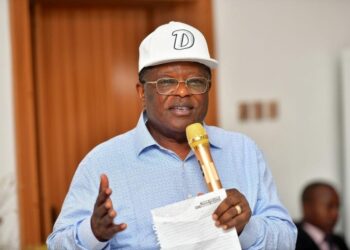The Lagos State Government has announced a shift in the current vehicle diversion point on the Third Mainland Bridge for motorists coming from Oworonshoki to Adekunle or Lagos Island, as part of the bridge will be shut for 2 weeks.
This disclosure is contained in a statement issued over the weekend by the Lagos State Commissioner for Transportation, Dr Frederic Oladeinde.
READ: Lagos says all schools below tertiary level remain closed indefinitely
Oladeinde said that shifting the diversion point on the bridge is to allow the removal, replacement and casting of joint No. 23, in addition to joints 16 and 17 presently being fixed by the contractor.
The Commissioner explained that the planned 2-week temporary traffic flow adjustment shall be from midnight of January 15, 2021, to midnight of January 29, 2021, adding that the current traffic status shall then be reinstated from 12.01 hours of January 30, 2021.
READ: Third Mainland Bridge closure: Lagos says alternative routes are in good shape
Going further, Oladeinde, in his notification to road users plying that axis, pointed out that there shall be no vehicular access from Iyana Oworosoki to Adekunle axis on the slip road/ramp down on the Third Mainland Bridge for the 2-week period, and motorists from Ogudu, Alapere and Gbagada going to Adekunle axis should use Ikorodu Road, Jibowu and Yaba as alternative routes.
He also said that there would be no access for vehicular movements from the Adekunle axis towards Iyana Oworosoki on Third Mainland Bridge during the period, adding that all Iyana Oworosoki bound traffic from Lagos Island, Iddo, Oyingbo, Adekunle and Yaba should use Herbert Macaulay Way, Jibowu and Ikorodu Road as alternative routes.
READ: Lagos State denies imposing fines on curfew violators
He said, “The current crossover position on the bridge for Adekunle or Lagos Island-bound traffic from Iyana Oworosoki between 12 midnight and 12 noon will now be at the new point for two weeks. The current shared movement of 12 midnight to 12 noon for Lagos Island traffic bound from Iyana Oworosoki shall remain, while the current 1 pm to 12 midnight Mainland (Iyana Oworosoki) bound traffic flow from Lagos Island shall also be maintained.”
Oladeinde reiterated that the Lagos State Traffic Management Authority (LASTMA) would continue to ensure the vigorous management of traffic control and enforcement on the bridge as well as on the identified alternative routes.
READ: Apapa Gridlock: Lagos moves to ensure uniformity in the license issued to barge owners by FG
He stated that LASTMA would ensure an endurable and acceptable traffic movement experience for motorists during the period, while all previous traffic flow advisory measures put in place by the Lagos State Government for the partial closure of the Third Mainland Bridge remained the same.
READ: Court jails Ex-Finbank MD and 3 others over N10.9 billion fraud
What this means
- The permanent closure of a section of the Third Mainland bridge is going to exacerbate the already bad traffic situation in the country, as Lagosians are to brace up for a harrowing experience.
- This is because the route is the major access point to and from the Island.
In order to accomplish the reopening of the Third Mainland Bridge on February 22nd, 2021 after the completion of the on-going maintenance works, LASG has shifted the current diversion point on the bridge for motorists coming from Oworonsoki to Adekunle or Lagos Island.#LASG pic.twitter.com/XiWdJQ865h
— The Lagos State Govt (@followlasg) January 11, 2021






















There was no mention of a permanent closure of the b4idge in this announcement. The only times when we’ve had permanent closure and likely to have is when certain joint needs to be replaced. And mostly its for around 48 hrs or 72hrs at most.